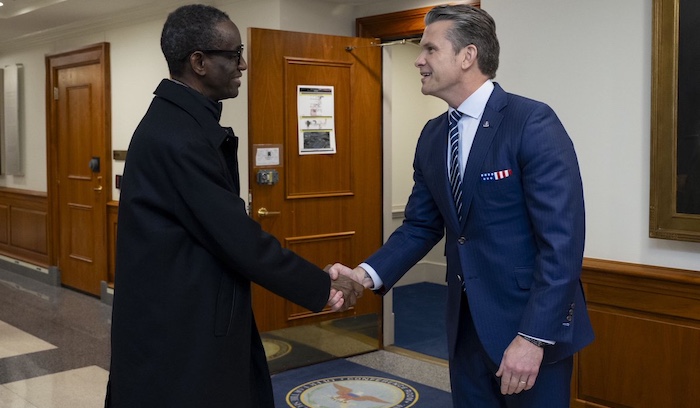Politics
US and Nigeria Discuss Security Amid Concerns Over Religious Freedom

A significant security meeting took place at the Pentagon on March 15, 2024, between United States Defense Secretary Pete Hegseth and Nigeria’s National Security Adviser Mallam Nuhu Ribadu. This closed-door discussion, which also included Chairman of the US Joint Chiefs of Staff Gen. Dan Caine, was prompted by heightened tensions following President Donald Trump’s recent warning of potential US military intervention in Nigeria due to allegations of violence against Christians.
The meeting was not included in official schedules, reflecting the sensitive nature of the talks. Ribadu’s visit to Washington was part of a broader initiative by the Nigerian government to address what it describes as “harmful mischaracterisations” regarding religious freedom and the overall security situation in Nigeria. In recent days, Trump asserted that the US military could “go in fast, vicious, and sweet” against groups he identified as “Islamic terrorists killing Christians in Nigeria.” His comments were fueled by extensive coverage from far-right media outlets and support from Republican lawmakers, including Sen. Ted Cruz and Rep. Riley Moore, who have echoed claims of a Christian genocide occurring in the country.
In light of these developments, the United States has re-designated Nigeria as a Country of Particular Concern (CPC) due to alleged violations of religious freedom. This designation has been firmly rejected by Nigerian authorities. President Bola Ahmed Tinubu stated that the decision was based on “misinformation and inaccurate data,” asserting Nigeria’s commitment to safeguarding freedom of worship for all citizens.
Concerns have been raised by security analysts in both Washington and Abuja about the feasibility of US military intervention in Nigeria. They argue that such an action could destabilise the region, especially considering the US’s current limited military presence in West Africa following the withdrawal from key drone bases in Niger.
During a press briefing, Deputy Assistant Secretary of State Jacob McGee noted that Trump’s warning has led to “frank conversations” with Nigerian officials. “We’re seeing engagement from the Nigerian side. Civil society groups welcomed the CPC redesignation, and we expect tangible steps from Abuja,” he said.
On Capitol Hill, Rep. Riley Moore has called for stronger guarantees to protect Christians during discussions with the Nigerian delegation. In response to mounting pressure, the Nigerian government reiterated that both Christians and Muslims are victims in the complex security landscape, which includes threats from groups like Boko Haram and ISWAP.
Ribadu’s visit included a series of meetings focused on military, intelligence, and congressional matters, aimed at improving US-Nigeria relations and correcting narratives that depict Nigeria as hostile towards Christians. Accompanying Ribadu were key officials, including Kayode Egbetokun, Inspector General of Police; Lateef Fagbemi, Attorney General of the Federation; and Olufemi Oluyede, Chief of Defence Staff.
This high-level meeting underscores the urgent need for collaborative efforts to address security concerns and uphold religious freedoms in Nigeria amidst growing international scrutiny.
-

 Health3 months ago
Health3 months agoNeurologist Warns Excessive Use of Supplements Can Harm Brain
-

 Health3 months ago
Health3 months agoFiona Phillips’ Husband Shares Heartfelt Update on Her Alzheimer’s Journey
-

 Science1 month ago
Science1 month agoBrian Cox Addresses Claims of Alien Probe in 3I/ATLAS Discovery
-

 Science1 month ago
Science1 month agoNASA Investigates Unusual Comet 3I/ATLAS; New Findings Emerge
-

 Science4 weeks ago
Science4 weeks agoScientists Examine 3I/ATLAS: Alien Artifact or Cosmic Oddity?
-

 Science4 weeks ago
Science4 weeks agoNASA Investigates Speedy Object 3I/ATLAS, Sparking Speculation
-

 Entertainment4 months ago
Entertainment4 months agoKerry Katona Discusses Future Baby Plans and Brian McFadden’s Wedding
-

 Entertainment4 months ago
Entertainment4 months agoEmmerdale Faces Tension as Dylan and April’s Lives Hang in the Balance
-

 World3 months ago
World3 months agoCole Palmer’s Cryptic Message to Kobbie Mainoo Following Loan Talks
-

 Science4 weeks ago
Science4 weeks agoNASA Scientists Explore Origins of 3I/ATLAS, a Fast-Moving Visitor
-

 Entertainment4 months ago
Entertainment4 months agoLove Island Star Toni Laite’s Mother Expresses Disappointment Over Coupling Decision
-

 Entertainment3 months ago
Entertainment3 months agoMajor Cast Changes at Coronation Street: Exits and Returns in 2025









